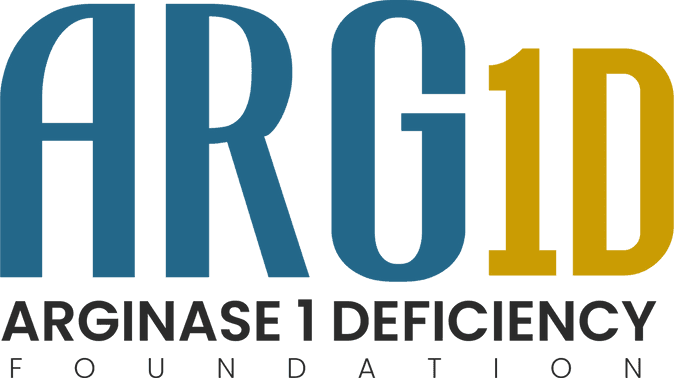Arginase 1 Deficiency (ARG1-D)
Also called Hyperargininemia
Arginase 1 Deficiency is a very rare, inherited disorder that affects the urea cycle — the body’s system for removing excess nitrogen. In people with this condition, the enzyme called arginase does not work properly. As a result, the amino acid arginine builds up in the blood instead of being broken down and safely removed.
Over time, high arginine levels are toxic to the nervous system, particularly the brain and spinal cord. This leads to the hallmark feature of arginase deficiency: progressive spasticity. Spasticity causes muscles to become stiff, tight, and difficult to control. Many individuals develop trouble with walking, balance, coordination, and fine motor skills. What often begins as mild stiffness can slowly worsen, affecting independence and daily activities.
In addition to spasticity, people with arginase deficiency may experience seizures, developmental delays or learning challenges, slow growth, differences in mood and energy, poor appetite, and vomiting. The gradual neurological damage from elevated arginine can be significant if not well controlled. Severe ammonia crises are less common, but with illness, stress, and/or high arginine levels some patients may experience toxic ammonia levels similar to other UCD’s.
Diagnosis is made by finding markedly elevated arginine levels in the blood, along with confirmation through genetic testing or specialized enzyme testing.
How It Is Treated Today
Current care focuses on lowering arginine levels and reducing nitrogen buildup to help slow disease progression and protect the nervous system. Treatment often includes:
· A carefully managed low-protein diet
· Medical foods and essential amino acid supplements
· Medications that help remove excess nitrogen from the body
Because individuals with arginase deficiency cannot safely process arginine, arginine supplements are not given, as they would increase arginine levels and worsen symptoms.
New Enzyme Treatment in Development
There is growing hope for a treatment that addresses the root cause of arginase deficiency.
Pegzilarginase (brand name Loargys®) is an enzyme replacement therapy designed to do what the body cannot — break down excess arginine. By lowering arginine levels, this treatment aims to reduce the toxic effects on the nervous system and help slow or stabilize the progression of spasticity and other symptoms.
Pegzilarginase is developed by Immedica and is already approved in many European countries and other regions for individuals with arginase deficiency. In the United States, it is currently under review by the U.S. Food and Drug Administration (FDA) and awaiting approval.
If approved in the U.S., pegzilarginase would become the first treatment to directly target the underlying enzyme deficiency, offering new hope for improving long-term outcomes and quality of life for individuals living with arginase deficiency.
For additional and more specific information regarding Arginase 1 Deficiency please reach out to the ARG1-D Foundation. https://arg1d.org/

